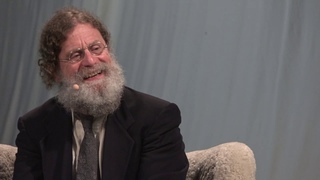Robert Sapolsky: why the Russians do not protest, how to cure imperialism and stop wars
I interview Robert Sapolsky today. He’s an American biologist and professor of neurology, and neurosurgery at Stanford University. But he is best known as the author of books that explain our behavior through science. He also explains the war in Ukraine, imperialism, and totalitarianism with science.
00:00 Robert Sapolsky, author of ‘Behave’ and ‘Why Zebras don’t get Ulcers?’ bestsellers.
00:59 Russia will lose all its opposition. Since Putin began mobilization, the situation has changed. Wars become very unpopular when your children come home in coffins.
06:23 The psychological phenomenon of imperialism. Something that people really like to be part of a huge great empire. The humiliation that it was once a great empire is the desire to ally with someone who promises the return of the past. Totalitarian Conformity: The answers reassure many people.
09:51 Trump in the USA with his slogan “Make America great again!“. America has never been great for minorities or women. So the former greatness is a myth. Look at Italy and Meloni, who is going to erect monuments to Mussolini. People who have lived through decades of repression are more receptive to conformity and will be the first to say, “Yes, we agree with everything.“
17:51 National character: nations are predisposed to the political system: let’s say Russians have lived under dictatorship for so long, and so it’s in their DNA. A number of people whom Stalin killed in the Gulag did not leave us copies of their genes. In fact, there is no such thing as a national character. A biological phenomenon is how you behave when you are surrounded by other people who think in a certain way. Christian fundamentalists believe it is okay to use violence to ban abortion. The reason is how often they go to church, where they are surrounded by people who think like themselves.
27:23 Values in individualistic and collectivist cultures. The ability to protest: The Russian people are condemned for their inability to rebel against the Putin regime. Iranian women endured about 40 years of oppression before the protests. When reforms fail, revolution breaks out. Events or leaders are capable of provoking.
32:55 Are there rebellious nations? In Ukraine, at least every ten years there is some kind of revolution. How wealth affects brain development in children from birth and beyond? We are biological machines and all we do is interact with the environment.
36:58 Is there any way we can fix ourselves? The Russians feel like hostages and cannot do anything. After the collapse of the Soviet Union, people stopped trusting each other. Life expectancy in Russia has declined: to alcoholism, violence, suicide, heart disease, and feelings of despair and helplessness. Change can only happen when people realize that they are not alone. For example, in Algeria, a dictator remained in power for another 30 years, and then he was gone in a week. How mobile phones could have stopped the First World War.
45:11 People who are fighting each other in Ukraine: there is no genetic or cultural difference between these people. And they have mobile phones. But there are people on the side of Russia, most of whom are very much brainwashed by propaganda. Warfare was invented 10,000 years ago, along with the development of agriculture. But the world as a whole doesn’t seem to change much over a long period of time. In the 17th century, the Swedes were the most insane and aggressive people in Europe. But they, the whole country, sat down and thought: “Let’s stop doing this!” Now it seems that Scandinavia is the best place to live on Earth. Germany is more open to immigrants than any other country in the EU because - we remember what our grandparents did. Change is possible.
53:50 People believe too much in the power of genes. Some things do not change, but they may look like the most dramatic changes have taken place: for example, today the Germans are trying to make amends for the sins of their grandparents with the same enthusiasm with which those same grandparents smashed Poland. In 50 years, Germany will again be the most militaristic country in the world, and everything will be built around the slogan “Make Germany great again.“























